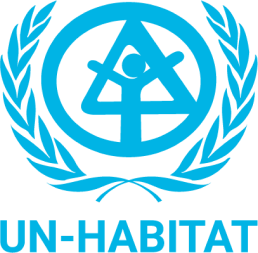
Yangon City, Myanmar, February 2019 – With the coordination of the International Cooperation Study Program by Fukuoka Prefecture Government and the UN-Habitat Regional Office for Asia and Pacific ROAP, ten students from different universities in Fukuoka made a two-day study visit to UN-Habitat, Myanmar and its project sites from 25 to 26 Feb 2019.
On the first day, the visiting students visited the UN-Habitat Country office before proceeding to the UN-Habitat facilitated Urban Research and Development Institute-URDI where UN-Habitat senior staff presented the country context, areas of work, community-driven development projects, policy development work and urban and disaster risk and reduction projects. The visiting students interacted with the presenters for further information, particularly on “the UN-Habitat People’s Process.”
In the afternoon, they visited the Central Training Center of the Ministry of Construction in Thuwunna. The Assistant Director of the center gave a presentation on the center which was established in 1965, its history and branches, training courses delivered, their cooperation with the National Skills Standard Authority (NSSA) for assessment in line with the ASEAN standardization. The students explored the center and observed the training rooms.
In the evening, the students visited the UN-Habitat Low Cost Yoma Housing Project funded by the Government of Japan for the poorest people in Dagon Seikan and South Dagon. The UN-Habitat national senior manager gave a short brief on the project, the beneficiaries selection process, formation of apartment user committees, and other points to note. The beneficiaries also expressed their gratefulness to the Government of Japan for the provision of their dwellings. The students queried about the selection criteria, duties of committee members and benefits and changes of the beneficiaries lives in term of this project, then the students toured the apartments. After that the students enthusiastically contributed labour to paint the water tank and collecting garbage together with the local communities.
On the second day, the students were taken to slum areas in Hlaing Thar Yar Township. Before touring the slum areas, the students had a briefing by the Programme Coordinator of the Bedar organization, a local NGO working on slum issues in Hlaing Thar Yar Township. The students also watched a documentary of the lives of squatters produced by Bedar organization with much interest. The students then toured the slums communities around the factory zones having a chance to observe the communities’ real situation.
In the afternoon, the group visited the UN-Habitat implemented Water Treatment Plant Project in urban poor settlement areas of Shwe Pyi Thar township. UN-Habitat started this water supply and sanitation project funded by the Government of Japan in Shwe Pyi Thar in 2018.The UN-Habitat Senior Engineer gave a presentation on the project, the project implementation process and the maintenance system set in place for sustainability. The students also met the water plant’s committee members. The students were able to learn of the positive changes of the lives of communities, particularly on hygiene and sanitation after having access to clean and purified water provided by project. The students toured the compound to view the water filtration system and visited the concrete road which was constructed under the same project for easy access to the water source, together with the local communities. This project benefits nearby communities of approximately over 5,000 people.
To sum up, the two-days tour was marked by much enthusiasm and strong interest by the visiting students in the work of UN-Habitat and also they learned much about the lives of the beneficiaries of UN-Habitat implemented projects in Yangon, therefore hopefully contributing to fulfilling the study programme’s objectives.





